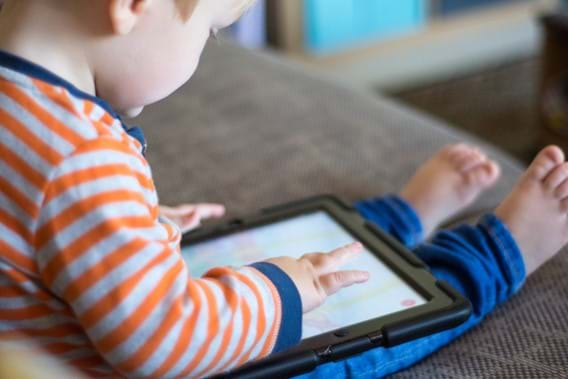
How Screen Time Affects Babies

Written by: Isabelle Lessard
Parents generally know that too much time spent in front of the TV, tablets and other screens disrupts babies’ development. But “too much”, that’s pretty vague… What are the real impacts of screens on children exactly? And what’s the official recommendation to follow? Here are the facts.
Delay in Cognitive and Language Development1
Adults say it all the time, they sit in front of a screen to “turn off their brains.” Same goes for toddlers; passively looking at a screen decreases the time spent reasoning (e.g., making logical connections) and interacting―which is essential to speech development.
Learning Disabilities
Studies show that kids who learn how to stack up blocks on an iPad (2D image) are not better at doing it in real life in 3D.2 Children who spend little time exploring and playing have more difficulty with spatial orientation (awareness of body position in space), and could experience learning disabilities once in kindergarten.3
Physical Impacts: Less Restorative Sleep and Obesity
Several studies summarized in a report by the Institut national de santé publique du Québec (INSPQ)4 have found that blue light emanating from screens affects the sleep quality at any age. Results also showed that spending time in front of screens creates a sedentary habit, which predisposes to obesity.
Bullying
A study has found that the more a 2-year-old spends time watching television, the more he or she is prone to being bullied at the end of primary school.5 What’s the link? When children spend a lot of time in front of screens, they have less opportunities to socialize and develop social skills. TV doesn’t teach children to be more assertive: an argument with siblings does!
These findings above are only a few of the many documented on the subject. This brings us to ask: is there an official recommendation? According to the Canadian Paediatric Society, babies under two years old simply shouldn’t be exposed to any type of screen; the screen time of 2- to 4-year-olds should be less than one hour per day; and 5- to 11-year-olds should not be exposed to screens more than two hours per day.
But is this realistic? It seems quite difficult to achieve when we look at INSPQ data: television exposure reaches on average 8.82 hours per week for children aged 2 and a half years.6 It’s legitimate for today’s overly busy parents to need a break from time to time, and that’s often what TV is for. That being said, it's all a question of degree. Parents must be able to recognize when their child is developing a dependence, and put an end to it quickly if such is the case. Parents who are aware of screens’ impacts are more motivated to help their child develop different interests.
1. Source : https://demarchesadministratives.fr/actualites/les-effets-des-ecrans-sur-le-developpement-du-cerveau-des-enfants (French only)
2. Source : https://demarchesadministratives.fr/actualites/les-effets-des-ecrans-sur-le-developpement-du-cerveau-des-enfants (French only)
3. Source : https://www.lesoleil.com/actualite/education/la-sante-du-cerveau-menacee-par-les-ecrans-b56eb5b4566d983578f389b5ae6576cb (French only)
4. Source : https://www.inspq.qc.ca/sites/default/files/publications/2154_temps_ecran_habitudes_vie.pdf (French only)
5. Source : https://www.lesoleil.com/actualite/education/la-sante-du-cerveau-menacee-par-les-ecrans-b56eb5b4566d983578f389b5ae6576cb (French only)
6. Source : https://www.inspq.qc.ca/sites/default/files/publications/2154_temps_ecran_habitudes_vie.pdf (French only)


